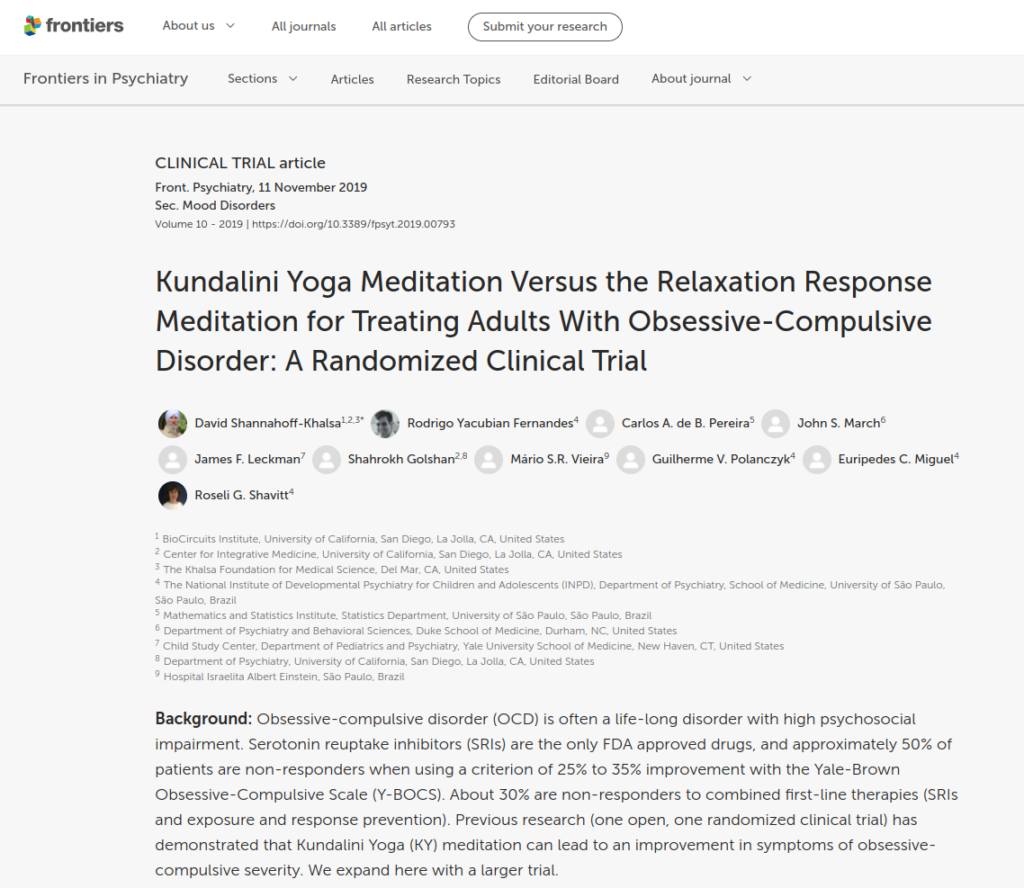Background: Obsessive-compulsive disorder (OCD) is often a life-long disorder with high psychosocial impairment. Serotonin reuptake inhibitors (SRIs) are the only FDA approved drugs, and approximately 50% of patients are non-responders when using a criterion of 25% to 35% improvement with the Yale-Brown Obsessive-Compulsive Scale (Y-BOCS). About 30% are non-responders to combined first-line therapies (SRIs and exposure and response prevention). Previous research (one open, one randomized clinical trial) has demonstrated that Kundalini Yoga (KY) meditation can lead to an improvement in symptoms of obsessive-compulsive severity. We expand here with a larger trial.
Design: This trial compared two parallel run groups [KY vs. Relaxation Response meditation (RR)]. Patients were randomly allocated based on gender and Y-BOCS scores. They were told two different (unnamed) types of meditation would be compared, and informed if one showed greater benefits, the groups would merge for 12 months using the more effective intervention. Raters were blind in Phase One (0–4.5 months) to patient assignments, but not in Phase Two.
Main Outcome Measures: Primary outcome variable, clinician-administered Y-BOCS. Secondary scales: Dimensional Yale-Brown Obsessive Compulsive Scale (clinician-administered), Profile of Mood Scales, Beck Anxiety Inventory, Beck Depression Inventory, Clinical Global Impression, Short Form 36 Health Survey.
Results: Phase One: Baseline Y-BOCS scores: KY mean = 26.46 (SD 5.124; N = 24), RR mean = 26.79 (SD = 4.578; N = 24). An intent-to-treat analysis with the last observation carried forward for dropouts showed statistically greater improvement with KY compared to RR on the Y-BOCS, and statistically greater improvement on five of six secondary measures. For completers, the Y-BOCS showed 40.4% improvement for KY (N = 16), 17.9% for RR (N = 11); 31.3% in KY were judged to be in remission compared to 9.1% in RR. KY completers showed greater improvement on five of six secondary measures. At the end of Phase Two (12 months), patients, drawn from the initial groups, who elected to receive KY continued to show improvement in their Y-BOCS scores.
Conclusion: KY shows promise as an add-on option for OCD patients unresponsive to first line therapies. Future studies will establish KY’s relative efficacy compared to Exposure and Response Prevention and/or medications, and the most effective treatment schedule.

